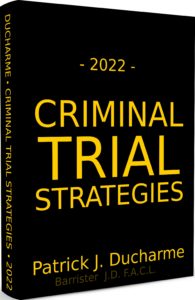Avoid These Mistakes in Opening Addresses:
1. Do not tell a jury that the evidence you intend to call will be presented in a disjointed or disorganized manner. It is unwise to begin an opening jury address with what appears to the jury to be an apology. The essence of a good opening address is to bring meaning to the evidence that is going to be presented. Suggesting, even inferentially, that the evidence to be presented is, in some way, incomprehensible because of its manner of presentation is contrary to good strategy. Instead, make every effort to describe the evidence in a manner that makes it sound comprehensible, cohesive and supportive of what the jury will anticipate will be your final argument. To do otherwise is to, at least subliminally, suggest to the jury that your side is partially defeated before you even begin to call evidence. Even if the jury members do not come to the conclusion that you are, in effect, apologizing for the manner of presentation of evidence, they will undoubtedly consider your opening address uninteresting. The opening address needs to be interesting. It should not have the appearance of an “apology.” Instead, it should suggest that you are about to present answers to your opponent’s case, and, the answers will provide the jury with reasons to reject your opponent’s case. In short, everything in the opening address should have a positive note. No apologies!
2. Do not tell the jury that everything that you are about to say to them is not evidence. This, sadly, is a stereotypical comment made in virtually every opening address. It is difficult to understand why it has become so common. It is true, of course, that counsel’s comments to the jury are not evidence. But only a seriously impaired thinker would ever consider the lawyer’s comments to be evidence. At best the comment is unnecessary, and at worst, it is insulting to the jury.
A possible explanation for lawyers telling the jury that their words are not evidence is a desire to convince the jury of the lawyer’s fairness; an effort to ingratiate. Counsel knows, of course, that the trial Judge will eventually instruct the jury that opening addresses are not to be considered as evidence. So this disclaimer may just be an effort by lawyers to align themselves with the trial Judge, perceiving that the jury will respect the trial Judge more than counsel because the trial Judge is assumed to be fair, knowledgeable and independent. In any event, it is my suggestion that the comment should not be made.
3. Neither counsel should refer to any evidence in an opening address that is not admissible, or evidence of questionable admissibility, at least prior to a ruling by the court on its admissibility. To do so risks creating a mistrial if the evidence is later ruled inadmissible. It is well established that the opening address is not the appropriate forum for argument, invective, or opinion. The Crown should use the opening address to introduce the parties, explain the process, and provide a general overview of the evidence that the Crown anticipates calling in support of its case. The Defence should follow the same format.
4. Counsel should be careful not to refer to the opponent’s case in a manner that may be considered argument. Generally, all references to the opponent’s case run the risk of being viewed as argument. In R. v. Mallory1 Crown counsel told the jury that the defence would invite them “to take the easy way out, to not perform your sworn duty which is to listen, watch, weigh all of the evidence of all of the witnesses, assess it unemotionally, and make a determination as to whether any of them merit your finding of honest, credible truthfulness. Don’t be seduced by the easy way out that the defence will offer to you. Don’t be convinced to look away from the evidence.” These were considered to be very improper as not only referring to the anticipated defence but as casting aspersions on opposing counsel.
The above is the an excerpt of Patrick J Ducharme’s book, Criminal Trial Strategies, available at Amazon or in bulk through MedicaLegal Publishing.
Read or listen to the Preface and Introduction and subscribe to Patrick Ducharme’s Youtube Channel.

